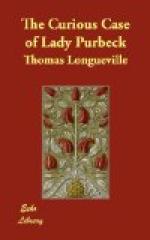“It were a long story to tell all the passages of this business, which hath furnished Paul’s, & this town very plentifully the whole week.” [One of the ecclesiastical scandals of that period was that the nave of St. Paul’s Cathedral was a favourite lounge, and a regular exchange for gossip.] “The Lord Coke was in great danger to be committed for disobeying the Council’s order, for abusing his warrant, & for the violence used in breaking open the doors; to all of which he gave reasonable answers, &, for the violence, will justify it by law, though orders be given to prefer a bill against him in the Star Chamber. He and his friends complain of hard measure from some of the greatest at that Board, & that he was too much trampled upon with ill language. And our friend” [Winwood] “passed not scot free from the warrant, which the greatest there” [Bacon] “said was subject to a praemunire, & withal, told the Lady Compton that they wished well to her and her sons, & would be ready to serve the Earl of Buckingham with all true affection, whereas others did it out of faction & ambition.”
Bacon might swagger at the Council Board; but in his heart he was becoming exceedingly uneasy. We saw, at the end of the last chapter, that he had received a very sharp letter from the King; and now the royal favourite himself also wrote in terms which showed, unmistakably, how much Bacon had offended him.[22]
“In this business of my brother’s that you over-trouble yourself with, I understand from London, by some of my friends, that you have carried yourself with much scorn and neglect both towards myself and my friends, which, if it prove true, I blame not you but myself.”
This was sufficiently alarming, and at least as much so was a letter which came from the King himself in which was written:—[23]
“Whereas you talk of the riot and violence committed by Sir Edward Coke, we wonder you make no mention of the riot and violence of them that stole away his daughter, which was the first ground of all that noise.”
It is clear, therefore, that if things were going badly for Coke, they were going almost worse for Bacon, who now found himself in a very awkward position both with the King and with Buckingham. Nor was he succeeding as well as he could have wished in his attacks upon Coke. He had made an attack by proceeding against him for a certain action, when a judge; but Coke had parried this thrust by paying what was then a very large sum to settle the affair.
In a letter to Carleton[24] Gerrard says:—
“The Lord Chiefe Justice Sir Ed. Coke hath payd 3500L for composition for taking common Bayle for some accused of Pyracye, which hath been urged agaynst him since hys fall. And perhaps fearing more such claps; intending to stand out the storme no longer, privately hath agreed on a match with Sir John Villiers for hys youngest daughter Franche, the mother’s Darling, with which the King was acquainted withall and writt to have it done before hys coming backe.”




